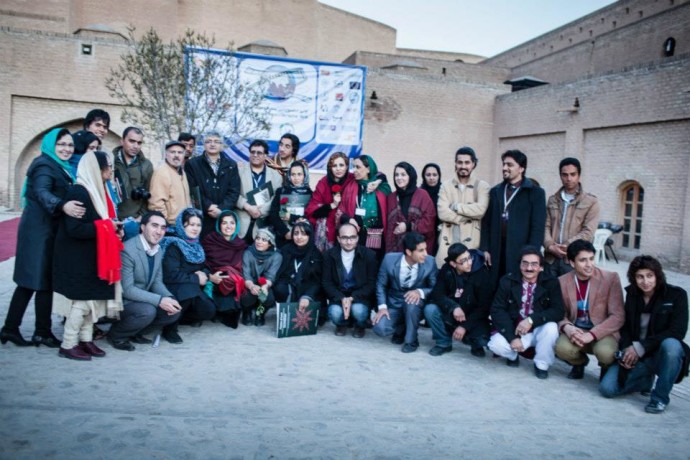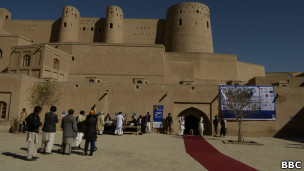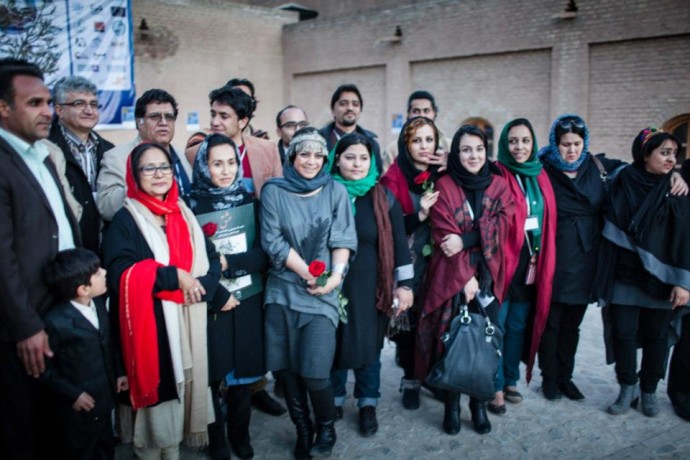International women’s Film Festival: “Women, most qualified ambassadors of peace”
Armanshahr Foundation and Roya Film House, headed by Guissou Jahangiri and Roya Sadat respectively, organised “The First International Women’s Film Festival-Herat” at the ancient citadel of Herat, 7-9 March 2013, marking 8 March, the International Women’s Day. More than 1500 people attended. The Festival Secretariat had received 100 films from 20 countries, out of which 10 films from Afghanistan and 25 films from other countries were screened. Several filmmakers from Afghanistan, Iran, Tajikistan and India were guests of the Festival.
The Film Festival hosted celebrated cultural figures of Afghanistan including Sadiq Barmak, a leading organiser of the Festival and the first Asian winner of the Golden Globe and the Cannes Festival prize for the film Osama, Maria Bashir, the first women prosecutor in Afghanistan, Mahbuba Jamshidi, director of Women’s Affairs Department in Herat province, Aziza Khayrandish, director of the Civil Society and Human Rights Network in Herat and a leading organiser of the Festival, Eng. Latif Ahmadi, the celebrated Afghan filmmaker, Ebrahim Arefi, head of Afghan Film, Afsar Rahin, cultural director of Afghanistan’s Ministry of Information and Culture, Aqila Rezaei, actor and filmmaker, Diana Saqeb, filmmaker, Aziz Dildar, leading organiser of the Festival, actor and filmmaker, and Fereshteh Etminan, the young Afghan actor.
International guests of the festival included: Gelareh Kiazand, filmmaker from Canada, Marzieh Riahi, editor of the Short Films News Website from Iran, Zulfia Sadiqof, secretary of the Didar Festival from Tajikistan, and Nupur Basu, filmmaker and representative of the IAWRT Asian Women’s Film Festival.
Roya Sadat said: “This Festival is a proper channel to connect the women of Afghanistan both at home and abroad to discuss the challenges they are facing. One of the reasons why we chose Herat to organise the Festival, beside its historic and cultural background, was the relative calm that prevails here.”
Rooholamin Amini, deputy director of Armanshahr Foundation in Afghanistan and secretary of the Festival, addressed the governor of Herat in his closing speech: “By organising this Festival, we took the first step with your support and that of the other officials. We hope, you will take the next step to build a cinema theatre in Herat and we support you.”
Guissou Jahangiri, director of Armanshahr Foundation and member of the organising committee of the Festival, told the Armanshahr website: “Afghanistan and its neighbouring countries are going through unclear and critical conditions. Gender inequality, misogyny and war are characteristics of this historical period in the region. We, civil and cultural activists, needed to clearly express our concerns through the Seventh Art and women’s participation. This Festival is the outcome of a long experience of the years of living with war and suppression. Women are now the most qualified ambassadors of peace. By underlining the social problems and challenges they are facing, they are standing up to harbingers of darkness and peace haters.”
Rooholamin Amini told the Armanshahr website: “a film festival on women’s issues is a significant event in itself in Afghanistan, because we have managed to bring together two problematic issues in this society: cinema and women’s conditions. There is also another dimension to this event. The Festival was held at the best possible place, best possible time and in the worthiest manner. Indeed, we were able to save face before the women and filmmakers of this land. In my opinion, the next Festivals will be organised much better. The first Festival attracted the attention of filmmakers, people, national and international media and even government officials; more than 40 national and international institutions supported this Festival.”
Elka Sadat, the other secretary of the Festival, stressed: “The organising of this Festival on International Women’s Day is of great significance. We did not expect such a high-profile participation of women. Women constituted half of the viewers of some films and occasionally more than men. Artistic films are rarely viewed in Afghanistan. Consequently, the screening of films from other countries provided an astonishing and educating experience that raised the level of their awareness. Another outstanding aspect of this Festival was the presentation of Herat as a city with many attractions for tourists. Many participants of the Festival believed that the emphasis on the ancient status of Herat was very important. It was on that basis that the Festival was held in the historic Ekhtiareddin Citadel, otherwise known as the Aleksander Citadel.”
Ms Maria Bashir, who took part in the closing ceremony of the Festival, said: “It is a great honour to see the International Women’s Film Festival in Herat on 8 March, with so many participants and international coverage. I deeply feel the impact of presenting the suffering of Afghan women by means of cinema and I sincerely congratulate the success of this Festival, especially to women filmmakers.”
In one of the round table discussions on the fringe of the Festival, some people commented that films should be chosen and screened with a view to “the society’s pulse.” However, the organising committee of the Festival explained: “We should not restrict ourselves to the society’s pulse alone; we must have the courage to screen films that go beyond the average level of the audience. Only in that case can we change the society.”
Latif Ahmadi, one of the speakers of the closing ceremony, stated: “It is a great honour to witness a great event in the history of Afghanistan’s cinema in ancient Herat.”
Sadiq Barmak praised the Festival, saying: “I am greatly honoured to take part in organising this Festival, which was my wish, shoulder to shoulder with my sisters, in the lovable ancient historic city of Herat. When I see myself in this Citadel, I’m reminded of the renaissance of Herat. I noticed that the progeny of great thinkers are still caring for their culture and their art on the silver screen. I bow before the women who had the courage to hold this Festival.” He congratulated the success of the Festival to all and in particular to Armanshahr Foundation and Roya Film House.
Ebrahim Arefi, head of Afghan Film, said: “I promise to accompany the Festival organisers next year from the first moment to the end and I hope that we shall, in collaboration with the officials, Herat’s cinema theatre at the opening of the Festival.”
It is to be noted that Herat’s cinema was destroyed after the Taleban took power in Afghanistan.
Governor of the city of Herat, Dawood Shah Saba, responded: “I’m highly in favour of building a cinema theatre in Herat, but financial resources are the only requirements. I hope that this will lay a strong foundation for building the ambitions of future generations for participation and a humane life.
“I thank Armanshahr Foundation for its great work in Afghanistan in the past few years, and consistently serving culture. I also thank Roya Film House for their endeavours to organise this Festival.”
Awarding two memorial plates to Guissou Jahangiri and Roya Sadat, he said: “I hereby express appreciation for all the cultural activities of Armanshahr Foundation and Roya Film House.”
Some of the participants and guests spoke to the media. One of the viewers, Khaled Qaderi, told the BBC: “Even though I am a social activist, my view of the women’s issue has changed after attending this Festival, noticing women’s enthusiastic participation and watching the films. These films had such an impact that made me notice the wider dimensions of women’s issue.”
Zulfia Sadiqof, actor and deputy director of Didar Film Festival of Tajikistan, referring to the final film screened in Herat’s Film Festival, “Rashton Bread” made by Shadi Saleh from Tajikistan, hoped that the women of Afghanistan would also be able to bake bread for the weddings of their children free from gender-based discrimination and be happy.
On the final day of the Festival, there was a video message of congratulation and support from Paola di Florio, documentary maker and Oscar nominee, in Los Angeles. She said: “When I heard the news of the Women’s Film Festival, my heart beat faster and I wish to say what an honour it is for me to support you. The women’s issue and breaking the silence about it is a universal matter and we are connected to each other.”
The International women’s film Festival came to a conclusion with a concert of local music at the yard of the Herat Citadel by 10 celebrated musicians of Afghanistan.
A large number of the media outlets gave coverage to the reports of the Festival including the local ones such as Mujda Radio, People’s Radio, Herat Radio and Television, Asia Television, Sheherazad (Girls) Radio, Camera monthly, Ettifaq Islam daily, Asr Television, Tolo Television, and Porsesh weekly.
The international media included: BBC Persian Service, Radio Farda, Agence France Presse, Huffington Post Live, Voice of America, China Post, Agura Voice, Radio France International, Zamaneh Radio, France Culture Radio, Pakistan’s Express Tribune and Dawn dailies, the UK daily Independent, the French El magazine, German Deutsche Welle Persian service, France 24 Television, Swiss Geneva Tribune, UNAMA, Short Films News Website (Iran), a number of online websites from Iran, Vietnam and other countries.
The Festival organisers promised to celebrate the International Women’s Day with a greater number of firms from different parts of the world in next year’s Festival.




